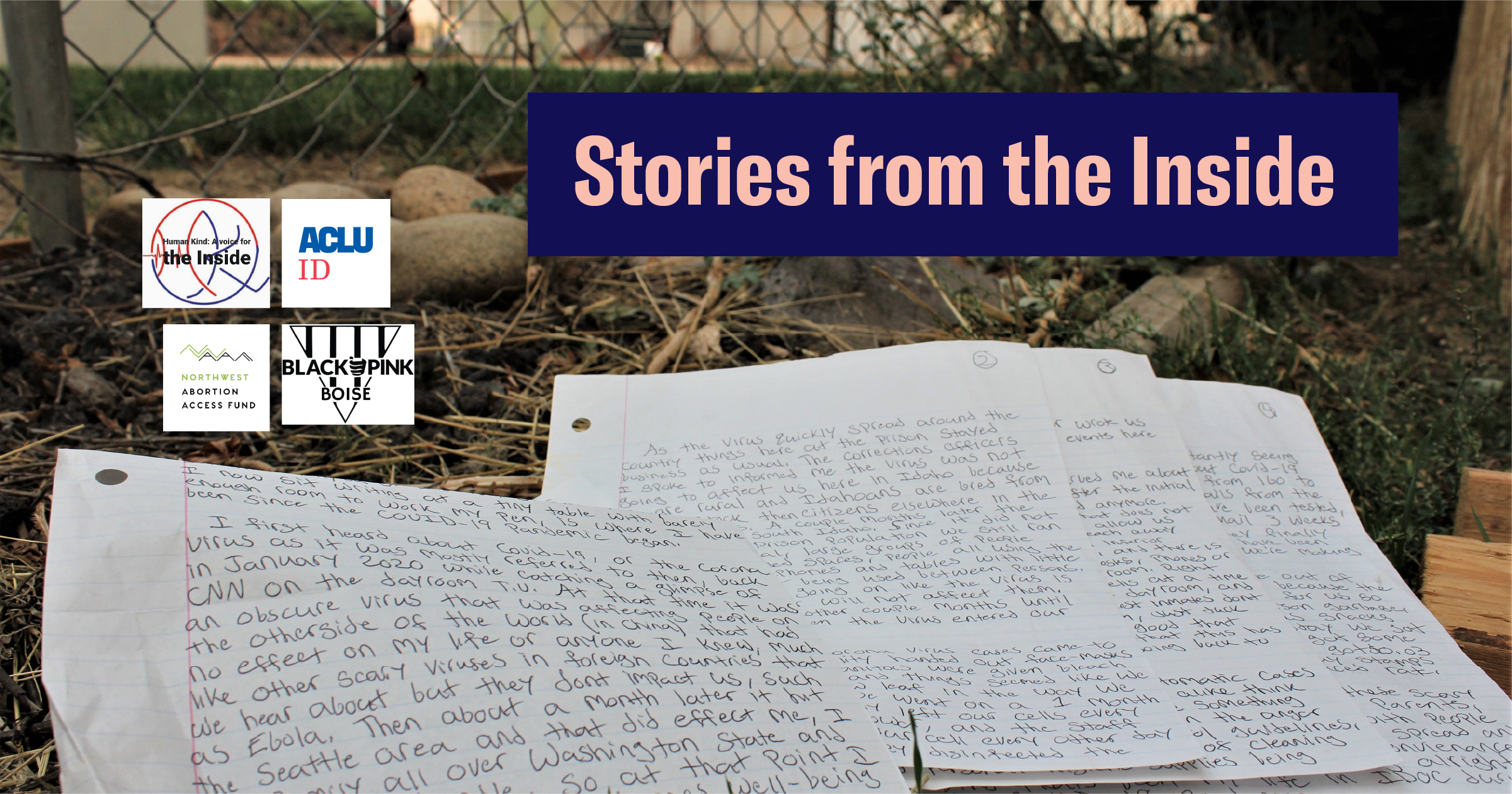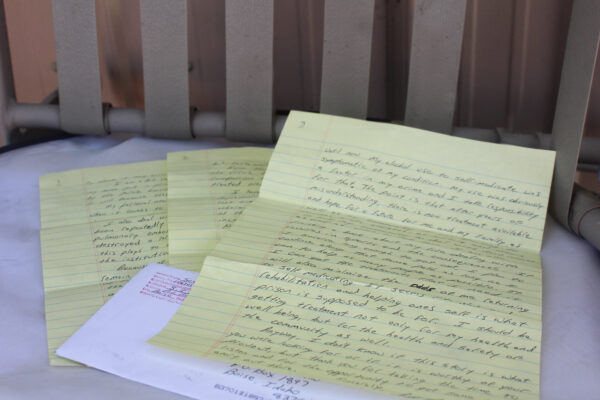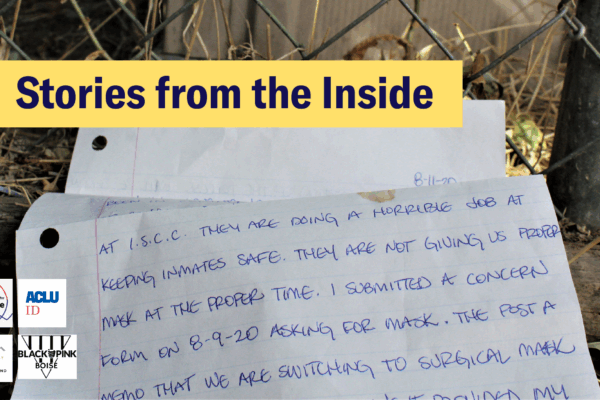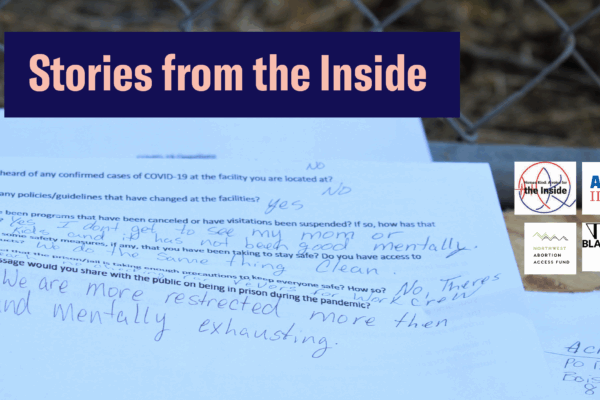August 18, 2020
My name is Kyle. To the state of Idaho, I am IDOC#109***.
I am currently serving a 13-year sentence for robbery. I was released in 2017 after serving four years of my sentence, then came back to prison in 2018 and am serving the remaining 7 ½ years of my sentence at this time.
In December of 2019 I got sent to closed custody here on G-block for the next 5 years. In this cell or one very similar to it, where I now sit, writing at a tiny table with barely enough room to work my pen, is where I have been since the Covid-19 pandemic began.
I first heard about Covid-19, or the Coronavirus as it was mostly referred to then, back in January 2020 while catching a glimpse of CNN on the dayroom TV. At that time, it was an obscure virus that was affecting people on the other side of the world (in China), that had no effect on my life or anyone I knew, much like other scary viruses in foreign countries that we hear about but they don’t impact us, such as Ebola [virus]. Then about a month later it hit the Seattle area and that did affect me. I have family all over Washington state and the Idaho Panhandle, so at that point I was nervous for my loved one’s well-being and [began] paying attention to the news.
As the virus quickly spread around the country, things here at the prison stayed business as usual. The correction officers I spoke to informed me the virus was not going to affect us here in Idaho, because we are rural and Idahoans are bred from sturdier stock than citizens elsewhere in the United States. A couple months later the pandemic hit South Idaho. Since it did not yet affect the prison population we still ran business as usual, large groups of people herded into confined spaces, people all using the same kiosks, telephones and tables with little or no disinfectant being used between people. Staff and inmates going on like the virus is all just a hoax or will not affect them. This went on for another couple months until mid-June, that is when the virus entered the facility.
When the first Coronavirus cases came to IDOC’s ISCC the facility handed out face masks and hand soaps. The janitors were given bleach to disinfect our tiers and things seemed good. We went on a one-month lockdown where we only left our cells every other day to take a shower, and the staff brought us phones to our cell every other day to call our families, they disinfected the phones after each use. The director wrote us JPAY emails keeping us updated on events here at the facility concerning COVID-19.
There were some things that disturbed me about the way things were handled here. After the initial two soap handouts, we have not received any more. We’re all locked inside a building that does not have windows that open slightly to allow us fresh air to breathe. They took the bleach away from the janitors leaving us with an inferior disinfectant to clean our cells with, and there is no disinfectant or rags to clean kiosks, phones or other community surfaces in our dayroom. Right now, they have us coming out 4 cells at a time, so we won’t be too crowded in the dayroom. And we are required to wear masks (most inmates don’t cover their nose and mouth with them, just tuck it under their chin for show) so it’s good that staff is at least trying, but now that this all became routine, things are just going back to the way they’ve always been.
There have been a lot of A-symptomatic cases here, so people, inmates, and staff alike think the virus has been hyped up to be something more than it is. You can see it in the anger of having to be under crowd control guidelines, supplies and personal hygiene supplies being given out to us. We are constantly seeing and hearing conflicting things about Covid-19 in the prison, numbers ranging from 160 to 700 cases at our facility, emails from the director telling us our units have been tested, when in reality we got that email three weeks ago and just today, 8/12/2020 they finally came and tested us. So things have been stressful, and crazy here, but we’re making it though.
A few good things have come out of this: our food has gotten better because the kitchen had to order pre-made food for us so we’re not eating the regular prison garbage. The case managers have brought us snacks every couple weeks, for example today we got a candy bar and last week we got some word searches. Our phone calls got $0.03 a minute cheaper and we can buy stamps to mail our family at a reduced rate.
So not all is bad, during these scary times worrying about my elderly parents, my children and having to deal with people who don’t understand how diseases spread and just think about comfort and convenience hasn’t been easy, but I'm doing alright. And that’s been my life at IDOC during the COvid-19 pandemic,
-Kyle
About the Stories from the Inside story project:
ACLU of Idaho, Black and Pink Boise, and HumanKind have collaboratively reached out to people who are currently incarcerated to share their view of the COVID-19 from inside Idaho jails and prisons. The experiences detailed in the submitted letters and responses are reflective of a prison system that lacks any standard of medical care for inmates and IDOC staff in the face of a global pandemic—even as the number of infected continues to rise. With the authors’ permission, we are publishing these letters here so their stories from the inside can be known.
Prisoners are people — and these are the real experiences they are having on a daily basis. All stories have been shared with written consent.
Read more Stories from the Inside
Black and Pink: Boise is an open family of queer & trans prisoners and "free world" allies who support each other.
Humankind: A Voice from the Inside is an organization committed to providing a voice for those navigating through the criminal justice system. We believe that everyone deserves fair and compassionate support in and outside of incarceration. Humankind envisions a world where individuals involved in the system are treated justly and receive adequate rehabilitation to become productive members of society. We need change, not chains.
The Northwest Abortion Access Fund is an abortion fund serving Washington, Oregon, Idaho, and Alaska. Trained, compassionate volunteer advocates run our toll-free hotline. We help people pay for their abortion care by sending funding directly to the clinic. We also help people get to and from the clinic and make sure people traveling for care have a safe place to stay.
We are a 501(c)3 nonprofit and a member of the National Network of Abortion Funds (NNAF), a membership organization of over 70 funds across the United States.





